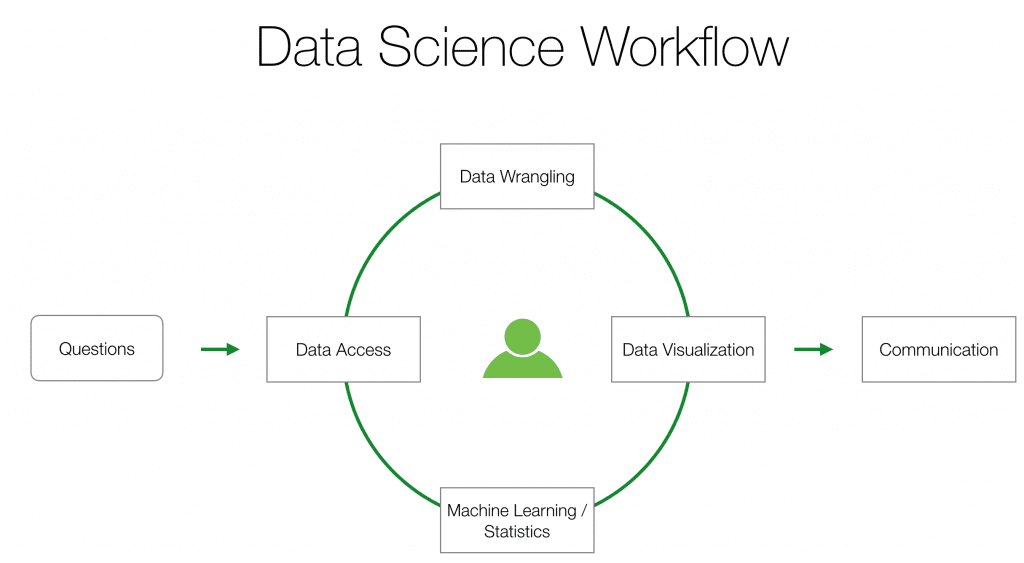The field of data science gained prominence when technology enabled Google to introduce the ranking systems for searches. Recommendations were looked at in LinkedIn and data suddenly began to influence all types of newsfeeds.
Currently, the fine art of data science has permeated through every known vertical including Human Resources. Can you even imagine a world devoid of mobile phones, digital payments, or self-driven cars? Yet, just over a decade ago the scenario was very different.
The evolving segment of Data Science Training behind the huge volumes of data generated every second today implies a large number of tasks being powered by insights generated by powerful statistical models. In spite of all this hype, it's still unclear what this field entails. What exactly does it take to become a data scientist with firms like Google and Apple?
What the data analyst and scientist does:
If we look at the most trending and lucrative Data Science Career, the one difference that sets these two categories apart is perhaps the areas of data science they operate in. It is a very huge and diverse field and demands the individual to have a strong understanding of advanced statistics and programming. The scientist’s role is more to clean, organize and make the data available in the desired format first.
Such data is then leveraged to train algorithms which are specifically used to execute the task on hand with maximum accuracy. The models are optimized, tested and re-engineered to provide desirable output in the form of products like forecasting engines.
In a way, the data scientist ensures the sustainable development and growth of the entire system and could also be called the architects behind a decision. Some firms like Mu Sigma Inc based out of Bangalore and Chicago have been the pioneers in this field in India.
The poorer cousin per se to the data scientist is the data analyst, who uses the created system so engineered to do the final live data-analysis and produce those forecasts and predictions to further particular goals and business outcomes.
So, whether the need is for a product-framework model being developed, a self-taught solution for optimization in a production process, or using the ML algorithm to provide and make decisions on a flight or hotel bookings, one definitely needs the services of both a data scientist and analyst.
Data science today in plain tech-speak is all about the latest technological infrastructure, analysis and repeated testing of pipelines, ML, AI, deep-learning algorithms, neural networks, modeling, decision-making ML, and innovative personalized data end-products.
The field is evolving rapidly:
Companies like Amazon, Airbnb, Etsy, Twitter, Facebook, Google, Apple and many more have greatly contributed to making data science a high-paying career. And, the sheer volumes of data being produced, is so large, that it seems unlikely that the Data Science Career aspirants will face a shortage of jobs, for the next decade or so.
Today data science is contributing to cancer cure and treatment needs, powering investigative tools for the law enforcement, high-tech medical imagery, and technologically advanced MRIs and CAT scans, as also the numerous uses of data in self-drive cars, making recommendations to leverage possible business markets and outcomes, in AI and ML-driven production technology, and providing the latest fintech digital solutions and multi-vertical end-products.
The requisite skills needed:
Since data analysts and scientists make a living off the collection, cleaning and modeling of data, testing and creating dashboards, visualizing petabytes of data, making statistical forecasts and inferences, and providing key verticals and stakeholders with the required decision-making prowess, the skills required of them are also multi-dimensional.
A course in data science training should educate the scientist in very short time-periods with practical skills, latest technology, and an ethical code besides non-transferable soft-skills and managerial experience. Though interest in data-analytics is the prime requisite, a sound degree in finance, economics, CE and engineering is a definite plus.
It also pays to specialize in performing areas like ML, Business Intelligence, and Decision Science which form the how, and whys of data science. Besides the practical aspects of techniques and best practices, you will need to be good at business modeling, data analysis, and communicative skills.
Parting notes:
Making a career in data sciences is definitely a good career choice. To succeed at it you will need a supportive learning partner like Imarticus Learning where the short-term courses are succinct, highly skilled and offer measurable certification. Besides who can refuse the offer of certified-trainers mentorship, assured placements, personality development and being job-ready from the first day?








